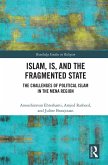Through case studies and statistical comparisons between Muslim majority countries and their regional counterparts, Muslim Democracy shows that countries with different religions but similar histories are not markedly different in their levels of democratization. What many Islamists and western observers call "Islamic law," moreover, is more a political than a religious construct, with religion more the tool than the engine of politics. "Women who drive in Saudi Arabia," as the author says, "are not warned they will go to hell, but that they will go to jail." With the political salience of religion rising in many countries, this book is essential reading for students of comparative politics, religion, and democratization interested in exploring the shifting boundaries between faith and politics.
Dieser Download kann aus rechtlichen Gründen nur mit Rechnungsadresse in A, B, BG, CY, CZ, D, DK, EW, E, FIN, F, GR, HR, H, IRL, I, LT, L, LR, M, NL, PL, P, R, S, SLO, SK ausgeliefert werden.
-- Arolda Elbasani, European University Institute, Florence
"Sometimes it seems like we have shifted seamlessly from ignoring religion's role in politics to overstating it when it comes to explaining the relative dearth of democracy in Muslim-majority societies. In his challenging and provocative new book, Schneier persuasively insists on the re-emphasis of political factors in accounting for the complex relationship between Islam and democracy across the globe."
-- Timothy A. Byrnes, Colgate University









